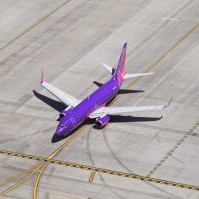 Want to know the best day of the week to buy tickets? How about the worst?
Want to know the best day of the week to buy tickets? How about the worst?
What’s the latest scheme that one airline has cooked up to save a buck? And which airlines got the worst ratings for 2010?
Peter chatted with The Wall Street Journal’s Scott McCartney about the latest in this week’s travel news.
Peter Greenberg: You had a great story this week in The Wall Street Journal about the best day not to buy a ticket/the best day to buy a ticket . I’ve been yelling and screaming for years it is Tuesday night or Wednesday. I guess I was sort of right, huh?
Scott McCartney: I think you were absolutely right. But the thing that really surprised me when we crunched a bunch of numbers and talked to a lot of people was how much more expensive the weekends are. And you know I felt kind of foolish. I mean I book a lot of tickets for family and all, and sit down on the weekend and do my searching, and see a price and buy it. And I’ve been, for all these years, probably paying too much.
Don’t miss these related articles:
- Save Money With Off-Season Travel: Peter’s Latest On AARP
- Finding Cheap International Flights
- The Best Day of the Week To Buy Cheap Tickets
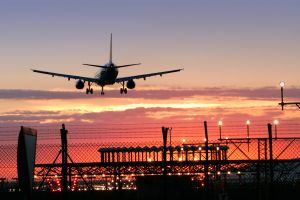 PG: You know I’ve seen some price differentials are crazy. I looked on the weekend last weekend to buy a ticket and thought, that seems a little expensive. So I waited until Tuesday and I went to the exact same itinerary on the exact same Web site, and it had gone down $180.
PG: You know I’ve seen some price differentials are crazy. I looked on the weekend last weekend to buy a ticket and thought, that seems a little expensive. So I waited until Tuesday and I went to the exact same itinerary on the exact same Web site, and it had gone down $180.
SM: I got an email today from a woman who had read the story, waited and ended up booking tickets to Europe for a family of four for $2,000 less than she almost paid last weekend.
PG: I’ll give you another one I just discovered today. I needed to get to Dallas, Texas, in the middle of February for one day. I went on the Web sites, and that included not just the individual airline sites, but also Kayak. I hope you’re fastening your seat belt: a round-trip flight from New York LaGuardia to Dallas on a Wednesday was $2,000.
SM: That is actually a very significant thing. Back in the late 1990s when business travel got so expensive, the $2,000 ticket to New York was sort of the benchmark for me. That was when I just thought, airfares are just getting outrageous. Low-fare competitors had plenty of room to come in and undercut. And then everything in the industry really turned upside down starting with 2001, but really because of the recession before then. Now we’re getting back to the $2,000 airfare and I really think it is a significant turning point. Fares are going to be a lot more expensive this year and you just found the canary in the coal mine.
PG: Well, guess what? I’m not paying $2,000. I went back on the Web site and punched in one stop. Now it makes no sense to go on stop from here to Dallas, but I’m doing it. You know why? It’s $436.
SM: It is a crazy part of the airline business. And they’re going to have to put you on two different flights and in some ways serve you twice as much, and you’re going to pay a whole lot less.
Related links:
PG: And enjoy the airline experience even more.
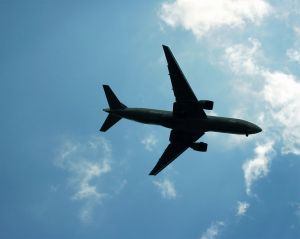 SM: That’s right, and get to see beautiful Lambert Field in St. Louis.
SM: That’s right, and get to see beautiful Lambert Field in St. Louis.
PG: An underused field, by the way. Ever since TWA pulled out and American basically cut their service there, the dominant carrier in St. Louis now is Southwest.
SM: Yeah, it was going that way before; that was a large part of TWA’s problem.
PG: How about this reverse bidding auction Delta is suggesting for people, so that if they get bumped the lowest bidder wins?
SM: I think it’s fascinating. You really wonder what’s going to happen when the frequent fliers start colluding. Or you start seeing a bunch of people show up at the 5 p.m. Friday flight to LaGuardia or wherever, hoping to get bumped. People have sort of played that game for years, but now it becomes an arbitrage. If you can get everybody on the airplane to bid nothing lower than $500 or something, then you could really stick it to the airline.
PG: If you could do that. I remember a flight that I was on where they asked if people could give up their seats; nobody did. The voucher went from $300 to $400, and nobody stood up. And it went to $600 and nobody stood up. It got to about $1100 and they had my attention. I was about to stand up when I got trampled by everybody else who figured out the same thing.
SM: That’s funny. You know the Department of Transportation has proposed raising the compensation for involuntarily bumping people even more. That raises the cap that’s in place on how far airlines will go. They would just as soon involuntarily bump you if they’d have to pay you $800 than give you $800 compensation, unless you’re willing to take the voucher which costs them a lot less.
Got frequent flier miles you’d like to redeem? Don’t miss this interview: Frequent Flier Rules, Airlines & Travel News: Leigh Gallagher Interview
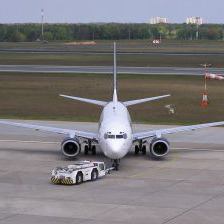 PG: Exactly.
PG: Exactly.
SM: It’s really going to be interesting to see if this works in favor of travelers or if this works against travelers.
PG: My feeling is it is going to work against travelers because there’s always going to be some idiot who bids $50 because he thinks he is getting a deal.
SM: Yeah I think that’s right. I don’t think the airline would have done this if it though it would have been more expensive for the airline.
PG: Oh no, the airlines banking on a parade of idiots.
SM: I think that’s right. You know for some people getting that $100 voucher or that $150 voucher, they are going to consider that a win.
PG: Oh boy, $150 voucher versus the $150 change fee. Hey let’s shift gears for a second. There were some great shots on your Middle Seat Scorecard where you rank the airlines, and there were some surprises and maybe not so many surprises. What did you think?
SM: I thought it was quite interesting how last year ended up. The big airlines really had a tough year, for a lot of reasons: Some of it for their own management; some of it for the impact of Mother Nature; and a lot of external events last year. The smaller airlines performed much better: Alaska, AirTran, even US Airways had a decent year. Delta had a terrible year. American has had several terrible years. But it was really quite interesting. One of the more fascinating things I think was there is a real difference in cancellations in strategies of different airlines. Delta is one that’s canceling very aggressively. And part of that is the tarmac delay rule is the airline’s own internal problems they’re trying to fix. I was over there this week; they are putting more spare airlines in their system. They’re really trying to improve reliability. But you know, your chances of getting canceled on one airline can be significantly different than on another carrier.
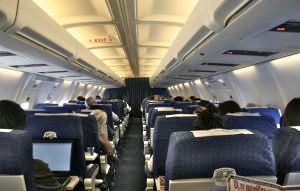 PG: I absolutely agree. And then of course you have just basic customer service.
PG: I absolutely agree. And then of course you have just basic customer service.
SM: Yeah just basic customer service. I think if anybody who travels regularly knows, there’s a huge decline in that. Southwest I thought fascinating. That’s a carrier that used to market itself as the triple-crown winner of three different categories, but now it’s highly mediocre. They were sixth place in baggage handling; seventh place in bumping people off of flights, which has gone way up.
PG: You know why they’re sixth place in baggage handling? Because they don’t charge for checked bags. Everybody is going over there and dumping bags on them.
SM: Yeah that’s a big part of the problem, but that doesn’t mean you don’t need to provide good service. If you’re going to carry them for free and you’re going to market the heck out of that, well you better provide good service.
PG: You’ve got to love their marketing campaign, and you’ll love their advertising campaign where they show you people in baggage-fee court.
By Peter Greenberg for Peter Greenberg Worldwide Radio.
Related links on PeterGreenberg.com:
- Frequent Flier Rules, Airlines & Travel News: Leigh Gallagher Interview
- Mileage & Reward Programs section
- Air Travel: Airlines & Airports section
- September is the Magic Month
- The Best Day of the Week To Buy Cheap Tickets
- Holiday Travel 2009 Forecast: How to Get the Best Deals












